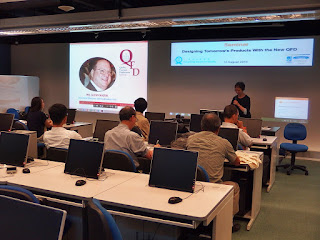A seminar named “You cannot design tomorrow's
products using yesterday's QFD” was organized by Hong Kong Society for Quality
(HKSQ) after the 27th HKSQ Annual General Meeting (AGM) on 12 Aug
2016. I would like to share both HKSQ
AGM 2016 and Seminar below.
Mr. Peter Fung (Chairman, HKSQ) held the meeting
and briefed the Chairman report to all members.
Until now, HKSQ has 366 individual members, 4 student members and 13
corporate members (by invitation only). Then
Peter briefed HKSQ activities in 2015/2016 including study mission to Purzer
Pharmaceutical Co., Ltd., Taipei, technical visit, international networking and
student project competition in LSG Sky Chefs.
After that our Hon. Treasurer Mr. Karson Chui
presented HKSQ financial status in the official report and unaudited report.
Ms. Minda Chiang (Hon. Secretary) reported all participants
tonight and AGM agenda. The nominations
of Office Bearers in 2016/2017 were shown below.
Chairman: Mr. Peter Fung
Vice Chairman: Ms. Angela Wong
Hon. Secretary: Ms. Sherman Ngan
Hon Treasurer: Dr. Lotto Lai
After that the AGM seminar guest speaker was Dr.
Catherine Chan and his topic named “You cannot design tomorrow's products using
yesterday's QFD”. Firstly, she introduced
the new QFD standard ISO 163555.
Then she introduced Mr. Glenn Mazur who was
Executive Director of QFD Institute, USA and the first person presented this
standard in ASQ World Conference for Quality and Improvement (WCQI). (Remark: I
attended his presentation with the topic named “ISO 16355: A Standard for
Innovative Customer Experience” in WCQI on 17 May 2016 (WCQI
Day 2))
Dr. Catherine Chan mentioned the purpose of ISO
163555 were “to elevate quality professionals to take on a leadership role in
new product development” and “to invigorate the Lean-6-Sigma Tool Set with QFD’s
Front-End Methods & Tools”. The
standard framework was shown as follows:
Part 1 – General Principle & perspective of QFD
Method
Part 2 – Acquisition of Non-quantitative VOC or VOS
Part 3 – Acquisition of Quantitative VOC or VOS
Part 4 – Analysis of Non-Quantitative &
Quantitative VOC/VOS
Part 5 – Solution Strategy
Part 6 – Optimization – Robust Parameter Design
Part 7 – Optimization – Tolerance Design &
Output to Manufacturing
Part 8 – Guidelines for Commercialization &
Life Cycle
Then she brief QFD – Quality Function Deployment
that was a method to assure customer or stakeholder satisfaction and value with
new and existing products by designing in, from different levels and different
perspectives the requirements that are most important to the customer or
stakeholders.
The word “Function” had separated into “Quality Function”
and “Product Function”. And there were
two types of “Deployment” that one was Extraction (Pull out the embedded items
or a particular aspect & organize the pulled out items systematically) and
the other was Conversion (Translate items of one aspect into items of another
aspect).
Extraction to Conversion = Voice of Customer → Demanded Qualities
→ Quality
Elements
However, the House of Quality ranking was not
mathematically operated and it was suggested to employ Analytic Hierarchy
Process (AHP) for improving the calculation.
Finally, Dr. Catherine Chan briefed the Theory
& Principles of QFD below.
i)
Prioritize
information to focus
ii)
Understand
how to cause good quality
iii)
Listen to
the Voice of the Customer
iv)
Observe the
customer’s situation
v)
Capture information
from other sources
vi) Improve
internal communication through the transformation of information between
perspectives
Our Chairman Mr. Peter Fung presented souvenir to
Dr. Catherine Chan.
Reference:
HKSQ - http://www.hksq.org/
HKQFDA - http://www.qfdhk.org/







沒有留言:
發佈留言